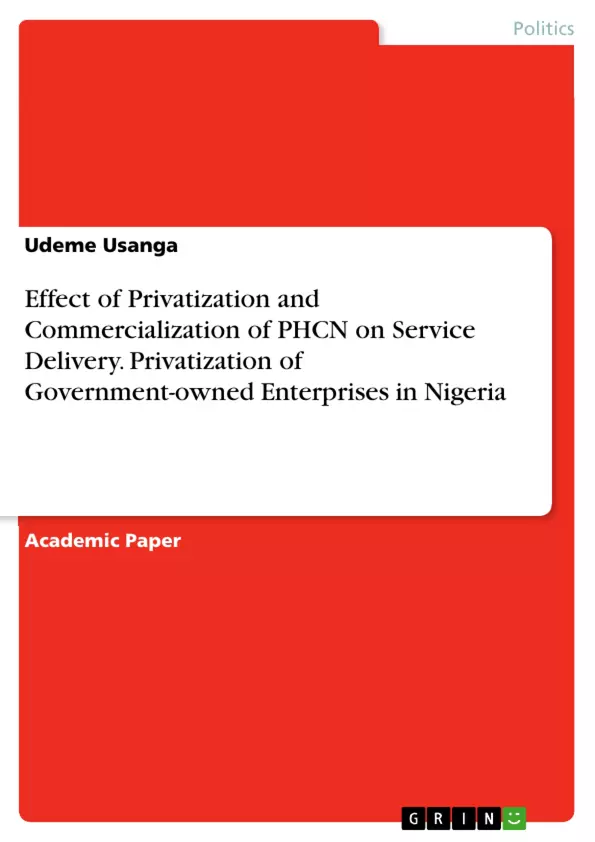Power Holding Company of Nigeria Limited (PHCN), a public enterprise was established, financed and managed by the Federal Government of Nigeria. The paper utilized both primary and secondary sources to analyzed the effect of privatization and commercialization of PHCN on service delivery to electricity customers in Uyo, Akwa Ibom State, Nigeria.
The study engaged one hundred and fifty-four (154) respondents randomly-selected from the five departments of PHCN, Uyo. The findings revealed that PHCN has to contend with internal and external externalities and constraints such as: poor funding of the enterprise, corruption, excessive control by the Federal Government, vandalization of its equipment by hoodlums, fraud, shady dealings, poor maintenance, damage to electricity infrastructure by windstorms and erosion, debts owed it and irregular rainfall. Government should examine and select the competent professionals as Public-Private Partners (PPP) and not people/enterprises with questionable character to handle commercialized and privatized Government enterprises . Capturing the confidence of labour Unions, building more power plants, staff training and motivation, monitoring of the privatization processes, transparency and accountability will check corruption, Government interference and recruitment
by patronage. The paper concluded that electricity is the bedrock of socio-economic development of any nation, hence priority must be set for its full privatization and commercialization as it did to the national telecommunication carrier, NITEL, so than Nigerians and Nigeria can grow and develop like other nations such as Malaysia, Indonesia and India, which have almost same characteristics as Nigeria. A Private sector-driven economy is key to this development and government must create this
opportunity and environment in Nigeria, if it must grow and develop industrially, socially and economically.
Table of Contents
- Chapter One: Introduction
- Background of the Study
- Statement of Problem
- Objective of the Study
- Significance of the Study
- Scope of the Study
- Definition of Concepts
Objectives and Key Themes
This study aims to determine the effect of privatization and commercialization of government-owned enterprises in Nigeria, focusing on the Power Holding Company of Nigeria (PHCN). It investigates the impact of these policies on service delivery, efficiency, and overall socio-economic development.
- The impact of privatization and commercialization on service delivery in the Nigerian context.
- The challenges and constraints faced by PHCN during and after privatization and commercialization.
- The role of government intervention and its influence on the success of privatization and commercialization initiatives.
- The socio-economic consequences of the privatization and commercialization of PHCN.
- Comparison of PHCN's performance before and after privatization and commercialization.
Chapter Summaries
Chapter One: Introduction: This chapter lays the groundwork for the study by examining the historical context of public enterprises in Nigeria, particularly focusing on the reasons for their establishment and the challenges they faced. It highlights the economic and social issues that led to state intervention in the economy and the subsequent reliance on a monoculture economy (oil). The chapter then specifically addresses the problems associated with the Power Holding Company of Nigeria (PHCN), including poor funding, corruption, government interference, and infrastructure issues. It introduces the concepts of privatization and commercialization as potential solutions and outlines the study's objectives and scope, focusing on the effect of these policies on PHCN's performance and service delivery in Uyo Zone, Akwa Ibom State. The chapter concludes by defining key concepts such as "public enterprises," "privatization," and "commercialization," clarifying their differences and implications for the study.
Keywords
Privatization, Commercialization, Public Enterprises, Power Holding Company of Nigeria (PHCN), Service Delivery, Government Intervention, Socio-economic Development, Nigeria, Case Study, Efficiency, Constraints.
Frequently Asked Questions: Comprehensive Language Preview
What is the purpose of this document?
This document provides a comprehensive preview of a study analyzing the effects of privatization and commercialization of government-owned enterprises in Nigeria, specifically focusing on the Power Holding Company of Nigeria (PHCN). It includes the table of contents, objectives, key themes, chapter summaries, and keywords.
What are the main themes explored in the study?
The study investigates the impact of privatization and commercialization on service delivery, efficiency, and overall socio-economic development within the context of PHCN. Key themes include the challenges faced by PHCN during and after privatization, the role of government intervention, and the socio-economic consequences of these policies. A comparison of PHCN's performance before and after these changes is also a central focus.
What is the scope of the study?
The study focuses on the Power Holding Company of Nigeria (PHCN) and its experience with privatization and commercialization. While the broader context of public enterprises in Nigeria is discussed, the primary analysis centers on the impact of these policies on PHCN's performance and service delivery, particularly in Uyo Zone, Akwa Ibom State.
What are the key objectives of the study?
The study aims to determine the effect of privatization and commercialization on PHCN's service delivery, identify challenges and constraints faced by PHCN, analyze the role of government intervention, and assess the socio-economic consequences of these policies. It also seeks to compare PHCN's performance before and after privatization and commercialization.
What are the key chapters and their summaries?
The document provides a summary of Chapter One: Introduction. This chapter sets the stage by examining the historical context of public enterprises in Nigeria, the problems with PHCN, and introduces the concepts of privatization and commercialization. It clarifies the study's objectives and scope, and defines key terms.
What are the key words associated with this study?
Key words include: Privatization, Commercialization, Public Enterprises, Power Holding Company of Nigeria (PHCN), Service Delivery, Government Intervention, Socio-economic Development, Nigeria, Case Study, Efficiency, Constraints.
What is the overall methodology of this study?
While not explicitly detailed in this preview, the mention of a "case study" suggests a qualitative and/or quantitative analysis of PHCN's performance and the impact of privatization and commercialization. More details would be found within the full study document.
- Quote paper
- Udeme Usanga (Author), 2015, Effect of Privatization and Commercialization of PHCN on Service Delivery. Privatization of Government-owned Enterprises in Nigeria, Munich, GRIN Verlag, https://www.hausarbeiten.de/document/1387601


